The Home Office does not record the reasons for the visit visa in a reportable format and to obtain the information requested could not be done without disproportionate cost.
The ‘Where are our nation’s donors ?’ APPG inquiry report published in December 2023 makes a number of recommendations and raises questions, so providing an ‘agenda’ for the APPG’s secretariat to pursue.
Click here to view or download a copy of the report
10.1.24 Meeting with Dr James Griffin, Clinical Director Therapeutics at NHS Blood and Transplant, Consultant Haematologist at University Hospitals Bristol NGS Foundation Trust
10.1.24 In person meeting with Helen Rowntree, Chief Executive Blood Cancer UK
11.1.24 Alexander Wood PhD, Network Manager, Renal Operational Delivery Network, North East and North Cumbria
15.1.24 Professor Gurch Randhawa PhD FFPH DL Professor of Diversity in Public Health & Director, Institute for Health Research, University of Bedfordshire
Parliamentary Questions tabled by Fleur Anderson MP:
•Question for Home Office
Stem Cells: Donors
To ask the Secretary of State for the Home Department, whether his Department has visa arrangements in place to permit registered stem cell donors entry to the UK for the purpose of donating.
Asked 18 January 2024
The Visitor route allows individuals to come to the UK to donate an organ to an identified recipient in the UK with whom they have a genuine or close personal relationship. They can also come to the UK to be assessed as a potential organ donor for an identified recipient in the UK with whom they have a genuine or close personal relationship. Visitors are not permitted to donate organs (or stem cells) to an anonymous donor, other than as part of a paired or pooled donation.
Answered 23 January 2024
By Tom Pursglove (Conservative, Corby)
•Question for Home Office
Stem Cells: Donors
To ask the Secretary of State for the Home Department, whether his Department has visa arrangements in place to permit registered stem cell donors entry to the UK for the purpose of donating.
Asked 18 January 2024
The Visitor route allows individuals to come to the UK to donate an organ to an identified recipient in the UK with whom they have a genuine or close personal relationship. They can also come to the UK to be assessed as a potential organ donor for an identified recipient in the UK with whom they have a genuine or close personal relationship.
Visitors are not permitted to donate organs (or stem cells) to an anonymous donor, other than as part of a paired or pooled donation.
Answered 23 January 2024
By Tom Pursglove (Conservative, Corby)
•To ask the Secretary of State for Education what plans she has to amend PSHE guidance for schools to promote discussion and awareness of organ, blood and stem cell donation.
•To ask the Secretary of State for the Home Department to include information about organ, stem cell and blood donation with passport application forms.
Question for Department for Transport
Driving Licences: Applications
To ask the Secretary of State for Transport, if he will make it his policy to include (a) information on and (b) opt-in forms for (i) organ, (ii) stem cell and (iii) blood donation with DVLA application forms.
Asked 18 January 2024
Following a request from the National Health Blood and Transplant Service (NHSBT), the Driver and Vehicle Licensing Agency (DVLA) introduced a process to enable driving licence applicants to register their details on the NHS Organ Donor Register. This can be done when applying for a driving licence using DVLA’s paper or online services. When an applicant notifies the DVLA that they wish to register as an organ donor, this is recorded on their driving licence and the NHS Organ Donor Register.
The Department remains happy to consider a similar process for stem cell and blood donation should such a request be received.
Answered 25 January 2024
By Guy Opperman (Conservative, Hexham)
19.1.24 Internal Meeting Group Secretariat x Chair’s office
Parliamentary Questions tabled by Dame Jackie Doyle-Price MP:
Question for Department of Health and Social Care
Stem Cells: Donors
To ask the Secretary of State for Health and Social Care, when she expects the Anthony Nolan and NHS Blood and Transplant State of the Registry report on stem cells to be published.
Asked 29 January 2024
We expect the report to be published by the end of February 2024.
Answered 12 February 2024
By Andrea Leadsom (Conservative, South Northamptonshire)
1.1.24 In person meeting with Genomics England team – led by Dr Maxine Mackintosh, Programme Lead, Diversity
6.2.24 In person meeting with Race Health Observatory : Angelie Balalingam & Sam Rodger
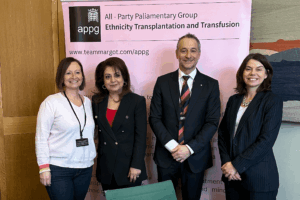
L to R: Nadia Martini, Baroness Mobarik, Yaser Martini, Sarah Olney MP (Chair of APPG)
7.2.24 ANNUAL GENERAL MEETING – click here for details
8.2.24 In person meeting with Nicole Elliott, Vertex Pharmaceuticals
26.2.24 meeting with Margaret Rioga and the research team at Buckinghamshire New University with Orin Lewis, ACLT
28.2.23 Meeting with Dr Radha Sundaram MBBS MRCP FRCA DICM FFICM
Clinical Lead organ donation NHSBT, Scotland organ donation
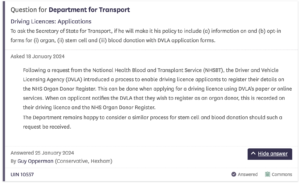 29.2.24 Written request to Wayne Lawley and Wendy Clark at NHS Blood and Transplant to formally request that the Department of Transport considers including stem cell and blood donation information and opt-in forms for stem cell and blood donation with DVLA application forms, to replicate what is already in place regarding organ donation.
29.2.24 Written request to Wayne Lawley and Wendy Clark at NHS Blood and Transplant to formally request that the Department of Transport considers including stem cell and blood donation information and opt-in forms for stem cell and blood donation with DVLA application forms, to replicate what is already in place regarding organ donation.
6.3.24 Meeting with John James OBE, CEO Sickle Cell Society.
11.3.24 Meeting with Greg Pycroft LLB (Hons), MSc Policy and Public Affairs Manager, Tenovus Cancer Care
18.3.24 Meeting with Amy Ronneberg MBA, Chief Executive Officer, NMDP BioTherapies
19.3.24 Meeting with Professor Bola Owolabi (MRCGP, MFPH Hon, FRSPH), Director of the National Healthcare Inequalities Improvement Programme at NHS England
19.3.24 APPG Steering Group meeting
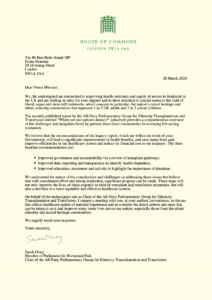 20.3.24 Open letter from APPG Chair, Sarah Olney MP to the Prime Minister calling for improved donor availability and transplant equity in the UK. There are over 110 co-signatories, including Sir Ed Davey, Alastair Campbell, Sir Trevor Phillips and Jay Blades MBE.
20.3.24 Open letter from APPG Chair, Sarah Olney MP to the Prime Minister calling for improved donor availability and transplant equity in the UK. There are over 110 co-signatories, including Sir Ed Davey, Alastair Campbell, Sir Trevor Phillips and Jay Blades MBE.
8.4.24 Group submission to the National Institute for Health and Care Excellence (NICE) Consultation on the Recommendation of Exa-cel for Severe Sickle Cell Treatment
11.4.24 Meeting with Cassy Fiford, PhD and Romisa Asadi, PhD from BTRU GEMS (Genomics to Enhance Microbiology Screening) at the University Of Oxford
12.4.24 meeting with Department of Health and Social Care (DHSC) Rare Diseases and Emerging Therapies team: Kath Bainbridge, Dammy Abiola and Ana Hallgarten La Casta.
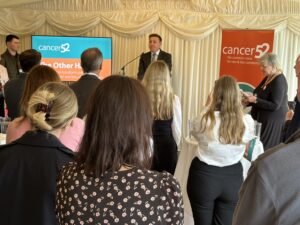 16.4.24 Cancer 52 Parliamentary Event – See: ‘The other half – a manifesto to transform outcomes for people with rare and less common cancers‘
16.4.24 Cancer 52 Parliamentary Event – See: ‘The other half – a manifesto to transform outcomes for people with rare and less common cancers‘
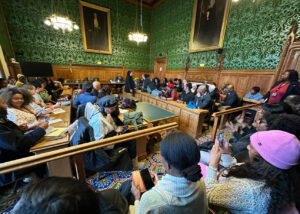 23.4.24 Details for Human Rights and Reparations: In Conversation with Professor Justin Hansford Event, hosted in Parliament by Bell Ribeiro-Addy MP
23.4.24 Details for Human Rights and Reparations: In Conversation with Professor Justin Hansford Event, hosted in Parliament by Bell Ribeiro-Addy MP
24.4.24 NHSBT Stakeholder event, Birmingham
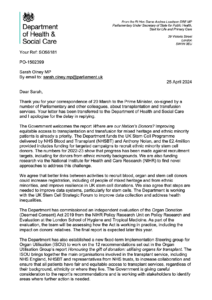 25.4.24 Response to Open Letter to the Prime Minister received from Rt Hon Andrea Leadsom MP at DHSC – click image of letter or here to read.
25.4.24 Response to Open Letter to the Prime Minister received from Rt Hon Andrea Leadsom MP at DHSC – click image of letter or here to read.
1.5.24 Imperial Sickle Cell Group meeting at Imperial College, London
1.5.24 NHSBT response to “Where are our nation’s donors?” inquiry report received. Click here to view and download.
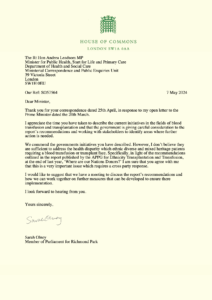 7.5.24 Letter to Rt Hon Andrea Leadsom MP at Department of Health & Social Care from Sarah Olney MP, Chair of the Group. Click here to view.
7.5.24 Letter to Rt Hon Andrea Leadsom MP at Department of Health & Social Care from Sarah Olney MP, Chair of the Group. Click here to view.
20.5.24 Sarah Olney MP, Chair of the APPG interviewed on the BBC Radio 4 programme: ‘Dying for a Transplant’.
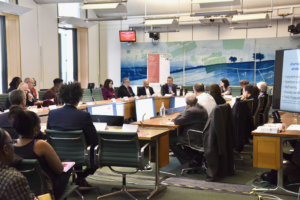 Inaugural Stakeholder event in Parliament
Inaugural Stakeholder event in Parliament
Sarah Olney, Chair of the All-Party Parliamentary Group For Ethnicity Transplantation and Transfusion announces Parliamentary Inquiry into diversity, donation and delivery, on 27 March.
Call For Evidence issued on 12 May
Please click here for the Terms of Reference for the inquiry and the call for evidence.
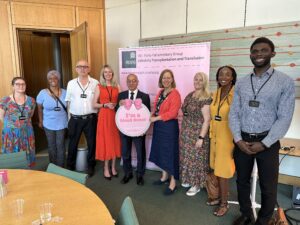 June 2023
June 2023World Blood Donor Day
On 14 June, to mark World Blood Donor Day, 13 MPs attended a Parliamentary awareness event, organised by Sarah Olney MP, Chair of the All-Party Parliamentary Group for Ethnicity Transplantation and Transfusion.
Zoom Evidence Gathering sessions held on 29 June
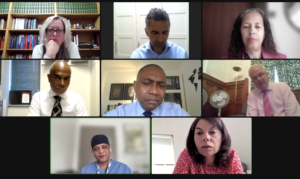 Witness Evidence Sessions were held as an important part of our inquiry into health inequalities in transplant and transfusion treatments. These sessions were chaired by Sarah Olney MP on behalf of the APPG, alongside Rt Hon Mark Tami MP and Jackie Doyle-Price MP.
Witness Evidence Sessions were held as an important part of our inquiry into health inequalities in transplant and transfusion treatments. These sessions were chaired by Sarah Olney MP on behalf of the APPG, alongside Rt Hon Mark Tami MP and Jackie Doyle-Price MP.
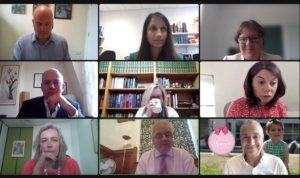 The sessions were recorded and are available to watch: Session 1 and Session 2
The sessions were recorded and are available to watch: Session 1 and Session 2
The sessions featured a panel of distinguished witnesses – please click here for their biographies. Their collective expertise illuminated the current state of organ, blood, and stem cell donation in the UK, particularly as it pertains to the needs and experiences of our diverse communities.
Dr Mark Bale appointed as the Chair of the Steering Group for the All-Party Parliamentary Group for Ethnicity Transplantation and Transfusion.
The following Parliamentary Questions were tabled. Responses received shown below:
Parliamentary Question tabled by Fleur Anderson MP:
•Question for Home Office
Donors
To ask the Secretary of State for the Home Department, how many visas were (a) granted and (b) denied for people visiting the UK for the purpose of donating stem cells in each year from 2010 to 2022.
Asked 21 November 2023
The following Parliamentary Questions were tabled by Jackie Doyle-Price MP:
The Department of Health and Social Care has provided the following answer to your written parliamentary question (3207):
•Question:
To ask the Secretary of State for Health and Social Care, what assessment she has made of the impact of funds dispersed by NHS Blood and Transplant to organisations for the purposes of raising awareness of organ, blood and stem cell donation. (3207)
Tabled on: 22 November 2023
Answer:
Andrea Leadsom:
NHS Blood and Transplant (NHSBT) provides funds to organisations via two routes, the Community Grants Programme and special project grants. Both funds complement and enhance NHSBT’s integrated marketing approach and are focused raising awareness, building trust with specific communities, and overcoming barriers to donation.
Since April 2023, The Community Grants Programme has provided around £700,000 of funding to 50 groups resulting in 304 initiatives, 134 events, 99 social media campaigns and 26 press and radio campaigns. The Community Grants Programme has contributed to increases in new Black heritage blood donors, increasing from 1% of new donors being from Black heritage backgrounds to 6% now. Overall, there was an increase from 31% to 48% of non-donors across ethnic backgrounds saying they would donate blood in July 2023.
The answer was submitted on 01 Dec 2023 at 13:08.
_____
The Department of Health and Social Care has provided the following answer to your written parliamentary question (3208):
•Question:
To ask the Secretary of State for Health and Social Care, what steps she plans to take to improve patient data on ethnicity. (3208)
Tabled on: 22 November 2023
Answer:
Andrew Stephenson:
NHS England’s Operational Planning Guidance for 2023/24 recognises the importance of improving the completeness of data on patient characteristics. This is one of the five strategic priorities in our drive to reduce healthcare inequalities. NHS England has therefore asked systems to continue to improve the collection and recording of ethnicity data across primary care, outpatients, accident and emergency, mental health, community services, and specialised commissioning. To aid this, NHS England is working to develop tools to support collection of ethnicity information in frontline services.
The answer was submitted on 29 Nov 2023 at 14:38.
_____
The Department of Health and Social Care has provided the following answer to your written parliamentary question (3211):
•Question:
To ask the Secretary of State for Health and Social Care, what assessment she has made of the potential merits of increasing self-sufficiency in UK stem cell donations. (3211)
Tabled on: 22 November 2023
Answer:
Andrew Stephenson:
The UK Stem Cell Strategic Forum, a Departmental advisory body, has recommended in its report A 10 Year Vision for Stem Cell Transplantation and Advanced Cellular Therapies that donor to patient unrelated donations in the United Kingdom should be increased to 45%. This will improve the sustainability and resilience of UK stem cell supply, maintain the UK’s expertise in stem cell provision and support adoption of advanced cellular therapies. The Department is investing £2.4 million between April 2022 and March 2025 to recruit stem cell donors to improve resilience and help address health inequalities.
The answer was submitted on 28 Nov 2023 at 12:48.
______
The Department of Health and Social Care has provided the following answer to your written parliamentary question (3211):
•Question:
To ask the Secretary of State for Health and Social Care, what assessment she has made of the potential merits of increasing self-sufficiency in UK stem cell donations. (3211)
Tabled on: 22 November 2023
Answer:
Andrew Stephenson:
The UK Stem Cell Strategic Forum, a Departmental advisory body, has recommended in its report A 10 Year Vision for Stem Cell Transplantation and Advanced Cellular Therapies that donor to patient unrelated donations in the United Kingdom should be increased to 45%. This will improve the sustainability and resilience of UK stem cell supply, maintain the UK’s expertise in stem cell provision and support adoption of advanced cellular therapies. The Department is investing £2.4 million between April 2022 and March 2025 to recruit stem cell donors to improve resilience and help address health inequalities.
The answer was submitted on 28 Nov 2023 at 12:48.
______
The Department of Health and Social Care has provided the following answer to your written parliamentary question (3210):
•Question:
To ask the Secretary of State for Health and Social Care, if she will review the (a) terms of reference and (b) governance of the UK Stem Cell strategic forum. (3210)
Tabled on: 22 November 2023
Answer:
Andrew Stephenson:
The terms of reference and governance of the UK Stem Cell Strategic Forum are reviewed periodically and on an ad hoc basis as required. The Forum published its latest report A 10 Year Vision for Stem Cell Transplantation and Advanced Cellular Therapies in July 2022 to address weaknesses in stem cell transplantation services. The Forum is working with the Department, NHS England, NHS Blood and Transplant, clinicians, industry, and representatives of patient groups to take the recommendations forward. An oversight committee and five working groups have been established in line with the current terms of reference.
The answer was submitted on 28 Nov 2023 at 12:47.
_____
The Department of Health and Social Care has provided the following answer to your written parliamentary question (3210):
•Question:
To ask the Secretary of State for Health and Social Care, if she will review the (a) terms of reference and (b) governance of the UK Stem Cell strategic forum. (3210)
Tabled on: 22 November 2023
Answer:
Andrew Stephenson:
The terms of reference and governance of the UK Stem Cell Strategic Forum are reviewed periodically and on an ad hoc basis as required. The Forum published its latest report A 10 Year Vision for Stem Cell Transplantation and Advanced Cellular Therapies in July 2022 to address weaknesses in stem cell transplantation services. The Forum is working with the Department, NHS England, NHS Blood and Transplant, clinicians, industry, and representatives of patient groups to take the recommendations forward. An oversight committee and five working groups have been established in line with the current terms of reference.
The answer was submitted on 28 Nov 2023 at 12:47.
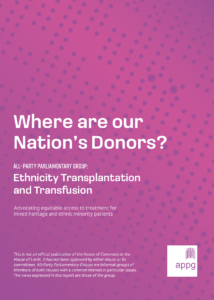
Click image above, or here to view and download report
Over 100 people attend Parliament on 4 December for the launch of the APPG Inquiry Report: “Where are our nation’s donors?“.
The launch followed a number of meetings with key stakeholders prior to the event and also some good news that Buckinghamshire New University had received funding approval for an evidence based research study on the enablers and blockers to people from mixed heritage and minority ethnic communities becoming blood and stem cell donors.
Team Margot’s mission
To help save and improve lives by educating, inspiring and motivating people, especially from ethnically diverse communities, to register as blood, organ, stem cell and bone marrow donors and to provide a range of support to families caring for child cancer patients.
Team Margot also provides secretariat support to the All-Party Parliamentary Group for Ethnicity Transplantation and Transfusion.